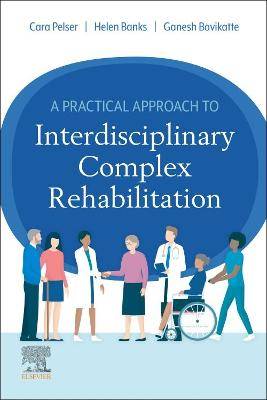BOOK OF THE MONTH - A Practical Approach to Interdisciplinary Complex Rehabilitation
Editors: Cara Pelser, Helen Banks, Ganesh Bavikatte
Price: £32.39
Publisher: Elsevier
eBook ISBN: 9780702082771 paperback ISBN: 9780702082764
I approached this book with slight trepidation, as ‘complex’ rehabilitation is not something I would consider an area of expertise (although there is certainly an argument to be made that all rehabilitation involves complexity). This book it is concerned primarily with large scale insults to the human body requiring multi-professional input. Illnesses and injuries such as traumatic brain injury, stroke, prolonged disorders of consciousness and complex mental health conditions are all referred to, along with many more conditions. Certainly, the degree of complexity involved is in excess of that normally encountered when engaging with a non-specific low back pain patient that is more within my comfort zone!
I need not have been worried though, as the book is somewhat diminutive in size and not at all imposing, and, once you begin reading, it quickly becomes apparent that the authors and editors have somehow managed to cram in both enough detail to ensure real practical applications can be retrieved from the book, but that it also never feels too heavy going. The writing style is pleasantly informal, and it does not feel as though you are being spoken to in the language of academia which can sometimes make textbooks needlessly inaccessible. For this the editors and contributors certainly deserve praise.
The contents are thorough and while it would be impossible for any book to cover all possible clinical presentations it makes explicit reference to many specific areas of complex rehab that health professionals working within the specialty will find particularly helpful in further grounding the theory.
Interdisciplinary team working
Early on the book clarifies the definition of interdisciplinary team working (IDT) and contrasts this with the arguably better known ‘multidisciplinary team working’ (MDT). This immediately engaged me as MDT working is widely accepted within the NHS as a standard way of working, but with the ongoing development of integrated care systems, and the push for services and clinicians to work much more closely, it struck me that IDT will be crucial if we want to achieve widespread improvements in patient outcomes.
IDT requires greater crossing of professional boundaries and as such greater trust between the professions to allow true collaboration centred around shared sets of patient goals. I would suggest that a lot of NHS services are still someway off from this, so it is fascinating to learn how intrinsic this is to complex rehabilitation. Certainly, something for all clinicians to take away and apply much more broadly.
Early on the book clarifies the definition of interdisciplinary team working and contrasts this with the arguably better known ‘multidisciplinary team working’ ... this immediately engaged me [Chris Tuckett]
The book consistently reinforces how critical different professions are to multiple aspects of complex rehabilitation whether its specialist rehab medics, specialist rehab nurses, speech and language therapists, dietitians, psychiatrists, occupational therapists and, of course, physiotherapists. This is important for two reasons: firstly, it reminds therapists that we are not the sole providers of rehabilitation, and that medics, dietitians and nurses are crucial to the completeness of rehabilitation and many services would benefit from these specialists’ input. Secondly, all these health professionals work together collaboratively, and while each may have areas of specialty and competence independent of each other, their impact is best maximised and most effective when it is informed and influenced by each other’s practice. This is the essence of true interdisciplinary practice.
Rehabilitation must be considered a 24-hour intervention
The book reminds us frequently that rehabilitation must be considered a 24-hour intervention that never really starts or ends meaning that it has relevance throughout the continuum from ‘prevention’ through to living with long-term conditions day-to-day. Again, something that we might sometimes forget, thinking that rehab only ‘begins’ once an insult, trauma or illness has occurred.
This is a book written very much with the healthcare clinician in mind, and, as stated earlier, it offers much in the way of practical application. However, the patient, related family members and carers are kept firmly in mind throughout, especially how interventions relate to, impact upon and can be perceived by these groups.
As a text it is well written, thoroughly referenced and easily digestible. Clinicians will find it of immense value if they work within complex rehabilitation, while those who do not will no doubt find the examples of interdisciplinary working enlightening. Recommended.
Chris Tuckett is a physiotherapist who is an associate director of allied health professions at an NHS trust
Follow Chris on Twitter: @HealthPhysio
BUY NOW! USE PROMO CODE PhysioUp FOR A 10% DISCOUNT
Share it with















